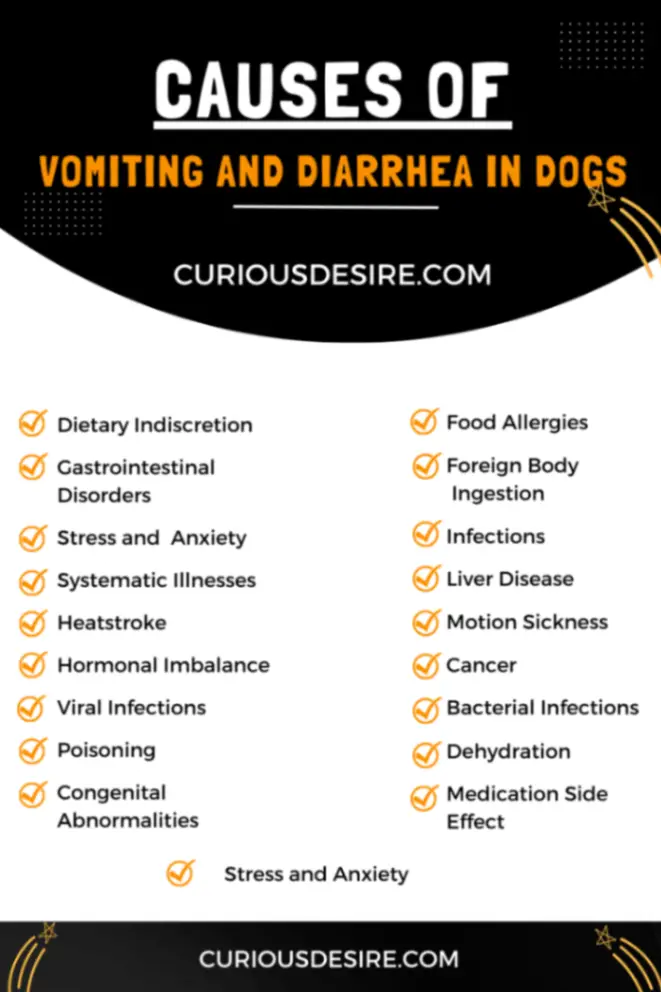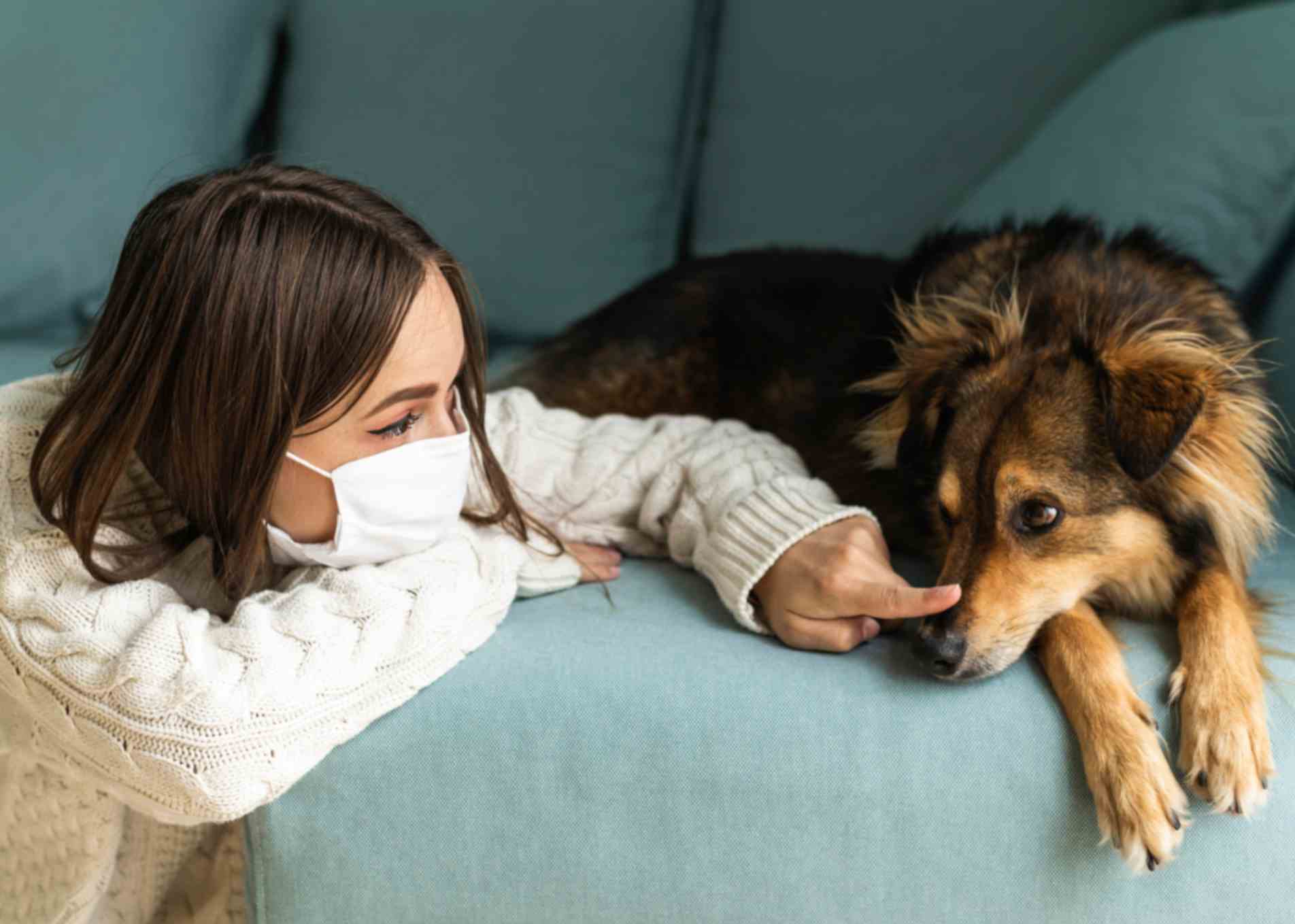When dogs start showing signs of vomiting and diarrhea, it can be a distressing experience for both the pet and their owner.
Dogs, much like humans, can experience gastrointestinal upset for a myriad of reasons, ranging from benign and easily treatable to more serious conditions that require immediate medical attention.
Understanding the potential causes of these symptoms is crucial for addressing the issue promptly and effectively.
In this blog, we will explore the common reasons behind these symptoms and discuss the appropriate measures to ensure your dog’s well-being.
5 most common causes of vomiting and diarrhea in dogs:
- Dietary Indiscretion
- Cancer
- Liver or Kidney Disease
- Toxic Ingestion
- Viral Infections

1. Dietary Indiscretion
One of the most frequent causes of vomiting and diarrhea in dogs is dietary indiscretion.
This occurs when dogs consume something they shouldn’t, such as spoiled food, garbage, table scraps, or even non-food items like plants, toys, or fabric. Their digestive systems may react negatively to these foreign substances, leading to gastrointestinal distress.
Sudden changes in diet, especially transitioning from one type of dog food to another, can also trigger vomiting and diarrhea.
To prevent dietary indiscretion, it’s crucial to keep harmful items out of your dog’s reach and ensure that their food is appropriate for their age, breed, and health status.
2. Food Allergies and Intolerances
Dogs, like humans, can develop allergies or intolerances to certain foods.
Common allergens include beef, dairy, wheat, and some artificial additives in commercial pet foods. When dogs consume allergens, their immune systems may react, leading to symptoms such as vomiting, diarrhea, itching, and skin rashes.
If you suspect that your dog has food allergies or intolerances, consult a veterinarian to conduct allergy testing or recommend an elimination diet to identify and eliminate the problematic ingredients from their food.
Switching to hypoallergenic or limited-ingredient diets may also help manage these conditions.
3. Infections
Infections caused by bacteria, viruses, fungi, or parasites can result in vomiting and diarrhea in dogs.
Common culprits include bacterial infections such as salmonella and E. coli, viral infections like parvovirus and distemper, as well as parasitic infestations from worms such as roundworms, hookworms, and giardia.
These pathogens can disrupt the normal function of the gastrointestinal tract, leading to inflammation, diarrhea, and vomiting.
Preventive measures such as regular deworming and vaccinations, as recommended by your veterinarian, can help reduce the risk of infections in dogs.
4. Gastrointestinal Disorders
Underlying gastrointestinal disorders, such as gastritis, inflammatory bowel disease (IBD), pancreatitis, or gastroenteritis, can manifest as vomiting and diarrhea in dogs.
These conditions may be triggered by a variety of factors, including dietary sensitivities, stress, infections, or genetic predispositions.
If your dog exhibits persistent or severe gastrointestinal symptoms, it’s essential to seek prompt veterinary care. Diagnostic tests such as blood work, fecal examinations, and imaging studies may be necessary to identify the specific gastrointestinal disorder and develop an appropriate treatment plan.
5. Toxic Ingestion
Ingesting toxic substances is a serious concern for dogs and can lead to life-threatening consequences, including vomiting, diarrhea, seizures, and organ failure.
Common household toxins for dogs include chocolate, xylitol (a sweetener found in gum and sugar-free products), certain human medications, household cleaners, and plants such as azaleas and lilies.
Moreover, some dogs may be sensitive to certain foods like grapes, raisins, and macadamia nuts, which can cause toxic reactions.
To prevent toxic ingestions, it’s crucial to pet-proof your home by keeping hazardous substances, foods, and plants out of your dog’s reach.
6. Foreign Body Ingestion
Dogs are curious creatures and may ingest foreign objects such as toys, bones, rocks, and fabric, which can become lodged in their gastrointestinal tract.
This obstruction can lead to vomiting, diarrhea, abdominal pain, and decreased appetite. In severe cases, it may require surgical intervention to remove the foreign body and alleviate the blockage.
To prevent foreign body ingestion, supervise your dog during playtime, and avoid giving them small objects that could be swallowed.

7. Stress and Anxiety
Just like humans, dogs can experience stress and anxiety, which may manifest in gastrointestinal symptoms such as vomiting and diarrhea.
Changes in routine, loud noises, separation anxiety, and unfamiliar environments can all trigger stress in dogs. Additionally, some dogs are more prone to stress-related gastrointestinal issues, especially during travel or when introduced to new situations.
Creating a comfortable and predictable environment for your dog, providing mental and physical stimulation, and using calming products such as pheromone diffusers or anxiety-reducing supplements may help alleviate stress-related symptoms.
8. Systemic Illnesses
In some cases, vomiting and diarrhea may be symptomatic of systemic illnesses that affect other organs or systems in the body, such as liver disease, kidney failure, diabetes, or thyroid disorders.
These conditions can indirectly impact the gastrointestinal tract, leading to digestive disturbances as secondary symptoms. Identifying and addressing the underlying systemic illness is essential to effectively manage these gastrointestinal manifestations.
Regular wellness exams, blood tests, and diagnostic screenings can aid in the early detection of systemic diseases in dogs.
9. Liver or Kidney Disease
Dysfunction of the liver or kidneys can lead to a buildup of toxins in the body, causing disturbances in the digestive system, including vomiting and diarrhea.
Dogs with liver or kidney disease may experience vomiting and diarrhea as a result of the compromised function of these vital organs.
10. Heatstroke
When a dog experiences heatstroke, its body temperature escalates dangerously high, often above 104°F (40°C). This excessive heat can cause direct damage to the cells in the gastrointestinal tract, leading to inflammation and impaired function.
The heat and resulting cellular damage can disrupt the normal absorption and digestion of food, leading to gastrointestinal upset manifested as vomiting and diarrhea.
If you suspect your dog is suffering from heatstroke, immediate cooling measures and veterinary care are crucial to reduce the risk of severe complications or death.
11. Motion Sickness
Some dogs experience motion sickness during car rides or other types of travel, leading to gastrointestinal upset and symptoms like vomiting and diarrhea as a result of the motion-induced distress.
Symptoms of motion sickness in dogs include:
- Whining and pacing
- Excessive drooling
- Yawning
- Lethargy or inactivity
- Vomiting
Just like people, some dogs may have a more sensitive vestibular system, making them more prone to the effects of motion.
12. Hormonal Imbalances
Hormonal imbalances, such as Addison’s disease (hypoadrenocorticism), can lead to vomiting and diarrhea in dogs.
Addison’s disease occurs when the adrenal glands do not produce enough steroid hormones. This deficiency can disrupt the balance of water, salts, and electrolytes in the dog’s body, leading to gastrointestinal symptoms such as vomiting and diarrhea.
Diagnosis often involves blood tests and an ACTH stimulation test, and treatment typically includes hormone replacement therapy to manage the condition.
13. Cancer
Cancer can affect various parts of the dog’s body, including the gastrointestinal tract.
Tumors in the stomach, intestines, or other parts of the digestive system can cause vomiting and diarrhea, either through the physical obstruction, inflammation, or by secreting substances that disrupt normal digestion.
Symptoms can vary widely depending on the type and location of the cancer. Diagnosis may require blood tests, imaging, and biopsy.
14. Exocrine Pancreatic Insufficiency (EPI)
Exocrine Pancreatic Insufficiency (EPI) is a condition where the pancreas fails to produce enough of the enzymes necessary for digesting food.
Without these enzymes, nutrients from food cannot be properly absorbed, leading to malnutrition and symptoms such as weight loss, diarrhea, and occasionally vomiting.
EPI is diagnosed through specific blood tests measuring the levels of pancreatic enzymes. Treatment involves dietary management and supplementing the diet with pancreatic enzymes to aid in digestion.
15. Viral infections
Canine distemper and other viral infections can cause gastrointestinal symptoms such as vomiting and diarrhea as part of their overall impact on the dog’s health and immune system.
Below are some of the notable viral infections affecting dogs:
- Canine Parvovirus (CPV): Canine parvovirus is highly contagious and particularly severe, affecting the gastrointestinal tract of puppies and unvaccinated dogs.
- Canine Distemper Virus (CDV): Canine distemper affects the respiratory, gastrointestinal, and nervous systems of dogs. Symptoms can include coughing, nasal discharge, vomiting, diarrhea, tremors, seizures, and, in severe cases, death.
- Canine Coronavirus (CCoV): Not to be confused with the coronavirus responsible for COVID-19 in humans, canine coronavirus primarily affects the intestinal tract and is usually of lesser severity compared to parvovirus.
16. Medication Side Effects
Many medications, while beneficial for treating specific conditions, can have side effects that impact a dog’s gastrointestinal system.
Common culprits include antibiotics, non-steroidal anti-inflammatory drugs (NSAIDs), chemotherapy drugs, and heartworm preventatives. These medications can irritate the stomach lining or disrupt the normal balance of intestinal flora, leading to vomiting and diarrhea.
Always inform your vet about any adverse reactions. They may adjust the dosage, switch medications, or prescribe additional treatments to mitigate these side effects, such as probiotics or gastro-protective drugs.
17. Bacterial Infections
Bacterial infections in the gastrointestinal tract can cause vomiting and diarrhea in dogs. Common bacterial culprits include Salmonella, E. coli, Clostridium, and Campylobacter.
These infections can occur from consuming contaminated food, or water, or coming into contact with feces from infected animals.
Treatment often involves antibiotics to combat the bacterial infection, alongside supportive care such as fluid therapy to prevent dehydration.

18. Poisoning
Poisoning is a critical condition caused by the ingestion of toxic substances.
Common toxins include human foods (chocolate, xylitol, grapes, onions, and garlic), household chemicals, certain plants, rodenticides, and antifreeze. Each toxin can cause a variety of symptoms, but vomiting and diarrhea are common initial signs as the body attempts to expel the poison.
Poisoning is an emergency requiring immediate veterinary attention. If you know or suspect your dog has ingested a toxic substance, contact your veterinarian or a poison control center immediately.
19. Congenital Abnormalities
Congenital abnormalities are disorders that are present at birth, resulting from genetic, environmental, or unknown causes
In dogs, these can range from minor issues that may not significantly impact the dog’s life to severe disorders that require medical or surgical intervention.
Early detection of congenital abnormalities is key to managing these conditions effectively. Regular veterinary check-ups, especially for breeds known to be predisposed to certain congenital conditions, can help identify issues early on.
20. Dehydration
Dehydration occurs when a dog loses more body fluids than it takes in, leading to an imbalance that affects the dog’s overall health.
Dehydration can lead to an imbalance in electrolytes which are crucial for muscle function and nerve signaling. An imbalance can disturb the normal function of the gastrointestinal tract, potentially worsening or contributing to vomiting and diarrhea.
When to Seek Veterinary Care
While occasional episodes of vomiting and diarrhea may be relatively benign, persistent or severe symptoms warrant veterinary attention. Signs that indicate the need for immediate veterinary care include:
- Blood in vomit or diarrhea
- Profuse or uncontrollable vomiting and diarrhea
- Lethargy, weakness, or collapse
- Abdominal pain or discomfort
- Dehydration (evidenced by dry gums, excessive thirst, and reduced urination)
- Sudden changes in behavior or appetite
- Persistent symptoms lasting more than 24-48 hours
It’s important to monitor your dog’s overall condition and seek professional guidance if you have concerns about their health.
Conclusion
Understanding the potential causes of vomiting and diarrhea in dogs is crucial for promoting their health and well-being.
Responsible pet ownership involves preventing known risks, seeking prompt veterinary care when necessary, and providing a nurturing environment for our canine companions.
By being attentive to our dogs’ needs and ensuring their health and safety, we can help them live happy, healthy lives free from gastrointestinal distress.
Let’s commit to being proactive, informed pet owners, ready to support our canine companions through whatever challenges may come their way.